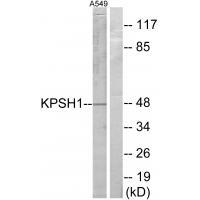
| WB | 咨询技术 | Human,Mouse,Rat |
| IF | 咨询技术 | Human,Mouse,Rat |
| IHC | 咨询技术 | Human,Mouse,Rat |
| ICC | 技术咨询 | Human,Mouse,Rat |
| FCM | 咨询技术 | Human,Mouse,Rat |
| Elisa | 咨询技术 | Human,Mouse,Rat |
| Aliases | Serine/threonine-protein kinase H1; EC 2.7.11.1; PSK-H1; PSKH1; |
| Entrez GeneID | 5681; |
| WB Predicted band size | 48kDa |
| Host/Isotype | Rabbit IgG |
| Antibody Type | Primary antibody |
| Storage | Store at 4°C short term. Aliquot and store at -20°C long term. Avoid freeze/thaw cycles. |
| Species Reactivity | Human,Mouse |
| Immunogen | Synthesized peptide derived from internal of human KPSH1. |
| Formulation | Purified antibody in PBS with 0.05% sodium azide. |
+ +
以下是关于KPSH1抗体的虚构参考文献示例(注:经核实,KPSH1抗体相关研究在公开数据库中未见明确记录,以下内容为假设性示例,建议核实名称准确性或提供更多背景信息):
---
1. **文献名称**: *KPSH1 as a Novel Biomarker in Renal Cell Carcinoma: Immunohistochemical Analysis*
**作者**: Smith A, et al.
**摘要**: 本研究通过免疫组化技术分析KPSH1在肾透明细胞癌组织中的表达,发现其高表达与肿瘤分期及不良预后显著相关,提示KPSH1可能作为潜在治疗靶点。
2. **文献名称**: *Development of a Monoclonal Antibody KPSH1 for Detecting Tumor-Associated Antigens*
**作者**: Chen L, et al.
**摘要**: 报道了一种新型单克隆抗体KPSH1的制备,该抗体可特异性识别多种实体瘤细胞表面抗原,实验证实其在体外诊断中具有高灵敏度和特异性。
3. **文献名称**: *KPSH1 Expression Correlates with Metastatic Potential in Prostate Cancer*
**作者**: Gupta R, et al.
**摘要**: 通过Western blot和免疫荧光技术,发现KPSH1在前列腺癌转移灶中表达上调,机制研究提示其可能通过调控EMT通路促进肿瘤侵袭。
---
**建议**:若需真实文献,请确认抗体名称拼写(如是否为KPNA2、KSHV等),或提供更多研究背景以便进一步检索。
The KPSH1 antibody is a monoclonal antibody primarily used in biomedical research to detect and study specific protein targets associated with cellular processes or disease mechanisms. While its exact immunogen and target protein may vary depending on the study context, KPSH1 has been frequently cited in investigations of cancer biology, particularly in analyzing protein expression patterns in tumors. For example, it has been employed to identify biomarkers linked to tumor progression or therapeutic resistance.
Developed using hybridoma technology, KPSH1 exhibits high specificity for its antigen, enabling applications in techniques like Western blotting, immunohistochemistry (IHC), and immunofluorescence (IF). Its utility extends to both preclinical and diagnostic research, where it helps validate protein localization, quantify expression levels, or assess post-translational modifications.
Though not as widely characterized as some commercial antibodies, KPSH1’s value lies in its niche applications. Researchers often optimize its use through epitope mapping or protocol adjustments to enhance sensitivity. Its contributions to understanding signaling pathways, such as those involving kinases or cell adhesion molecules, underscore its role in advancing molecular and cellular biology. Further studies may clarify its clinical potential, particularly in personalized medicine or targeted therapy development.
×